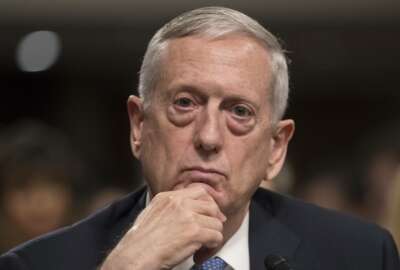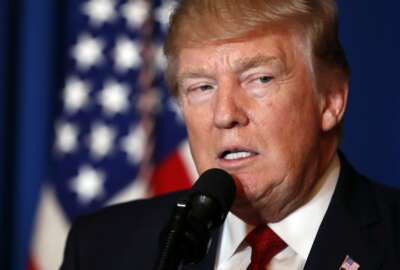
Will the Trump administration help or hurt defense reforms?
Trump's policies might save some money in DoD by reducing waste, fraud and abuse, but some changes, like the hiring freeze, might do more damage than good to th...
After two years of big reforms in the Defense Department Congress is still looking for ways to better the Pentagon. Defense officials say the Trump administration may help and hinder that goal.
Last week former DoD policy undersecretary Michele Flournoy, former DoD Deputy Secretary John Hamre and former DoD Comptroller Dov Zakheim pulled out the usual critiques of the Pentagon during a House Armed Services Committee hearing: bloat, waste, lack of accountability and duplication.
Congress spent the last two years trying to clean up, streamline and rearrange the department in its annual defense authorization act.
The 2017 law completely reformed the office of the undersecretary for acquisition technology and logistics. The year before, the NDAA gave military service chiefs more power over the development of weapons systems.
For 2018, defense experts say it’s time to focus in other areas like human resources, duplicative systems and military healthcare.
That might be a little easier with Defense Secretary James Mattis in office.
In his first memo as defense secretary, Mattis stated DoD must improve how it does business.
“We owe it to every U.S. citizen to build a military that is as effective and efficient as possible,” the Jan. 31 memo stated.
The Trump administration also said it would strive to cut out waste, fraud and abuse in government, a move reflected in Trump’s choice of fiscal hawk Mick Mulvaney as director of the Office of Personnel and Management.
A person like Mattis could come in handy for some of the age old reforms experts like Flournoy, Hamre and Zakheim have been harping on for years.
“I think you have an opportunity this year to provide the secretary with a package of authorities to help reinvigorate the civilian workforce,” Flournoy said. “Currently there are 66 different personnel systems that are being used for the civilian workforce in the Department of Defense today — 66. Imagine trying to manage that. Can we look at a consolidated approach under Title 10 that would really allow the secretary to tailor one system to hire, manage, develop, compensate, retain DoD’s civilian workforce?”
Flournoy added that DoD can find savings in its defense agencies like the Defense Finance and Accounting Service, the Defense Logistics Agency, the Defense Information Systems Agency and the Defense Health Agency.
“What I would encourage you to do is to require the secretary of defense to undertake a comprehensive management assessment of these agencies, looking at where best business practices, new technologies, and automation might actually improve performance and reduce cost, and create savings that could be reinvested in higher-priority areas,” Flournoy said.
That’s something Mattis may be able to get behind considering he wants to focus on business transformation in the Pentagon during his tenure.
But there are some Trump administration policies that might stymie defense reforms as well.
Flournoy said the hiring freeze is akin to using “a meat ax when you need a scalpel,” which is creating a “very challenging environment.”
“It’s a very blunt instrument because what it does is it cuts off your talent pipeline and so it prohibits you from hiring the best talent coming in, the next generation, even in the most high- priority areas. And so you basically create a personnel bathtub that will follow you through over time,” Flournoy said.
The hiring freeze has created problems all throughout DoD in areas that could end up as money savers.
The freeze is affecting the Defense Contract Audit Agency’s ability to audit incurred costs in a timely fashion as well.
The hiring freeze “is absolutely an issue for us because we came into [2017] lower on our end strength than we needed to complete the work we had planned for this year and we were under a hiring freeze in [2016] as a result of the 2016 defense authorization act,” Anita Bales, director of the DCAA, told Congress.
DCAA was planning on hiring 100 people a month and began doing that in the first quarter of fiscal 2017.
But the hiring freeze has kept DCAA from hiring since January.
“We are really getting behind the power curve on our ability to execute the work we need to this year and the later we hire in the year, at this point there is probably no way we can hire enough to complete the number of work years that we need to this year,” Bales said.
She added that about 5,000 employees would allow DCAA to do its portfolio of audits, about 10 percent lower than the workforce now.
Copyright © 2024 Federal News Network. All rights reserved. This website is not intended for users located within the European Economic Area.
Scott Maucione is a defense reporter for Federal News Network and reports on human capital, workforce and the Defense Department at-large.
Follow @smaucioneWFED





